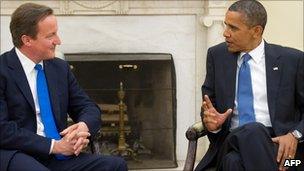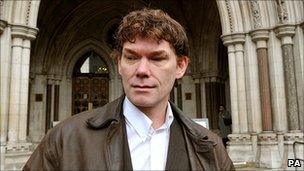Cameron and Obama discuss computer hacker Gary McKinnon
- Published

McKinnon's case was raised at the talks and at the press conference
David Cameron discussed the case of computer hacker Gary McKinnon during his talks with the US president.
At a press conference in Washington, the prime minister said Mr McKinnon was accused of a "significant crime" but hoped for a "way through".
Barack Obama said presidents did not get involved in extradition matters but he hoped for an appropriate solution.
Glasgow-born Mr McKinnon, who has Asperger's syndrome, is accused of hacking US military computer systems.
Mr McKinnon, of Wood Green, North London, says he was seeking evidence of UFOs.
Both Mr Cameron and Deputy Prime Minister Nick Clegg have publicly condemned plans to extradite Mr McKinnon to the US - where he faces up to 60 years in jail.
Last year Mr Cameron said that if Mr McKinnon, 43, had questions to answer there was "a clear argument to be made that he should answer them in a British court".
'Significant crime'
At a White House press conference on Tuesday alongside President Obama, Mr Cameron said of the case: "It is something that we discussed in our meeting.
"Clearly there is a discussion going on between the British and the Americans about this but I don't want to prejudice those discussions.
"We completely understand that Gary McKinnon stands accused of a very important and significant crime in terms of hacking into vital databases. Nobody denies that is an important crime that has to be considered.

Mr McKinnon's case is being reviewed
"I have had conversations with the US ambassador as well as raising it today with the president about this issue, and I hope a way through can be found."
President Obama said he had spoken with Mr Cameron about the "increasing challenge" faced by the internet and the need for greater co-operation on cyber security.
He said: "One of the traditions we have is that the President doesn't get involved in decisions around prosecutions, extradition matters.
"So what I expect is my team will follow the law, but they will also co-ordinate closely with what we have just stated is an ally that is unparalleled in terms of our co-operative relationship.
"I trust that this will get resolved in a way that underscores the seriousness of the issue, but also underscores the fact that we work together, we can find an appropriate solution."
American authorities allege that between February 2001 and March 2002, Mr McKinnon hacked into dozens of US army, navy, air force, and Department of Defense computers, as well as 16 Nasa computers.
They also say Mr McKinnon altered and deleted files at a US naval air station not long after the terrorist attacks on 11 September 2001.
In May, Home Secretary Theresa May agreed to an adjournment to delay a High Court decision on whether his extradition could go ahead. The government will review the case.